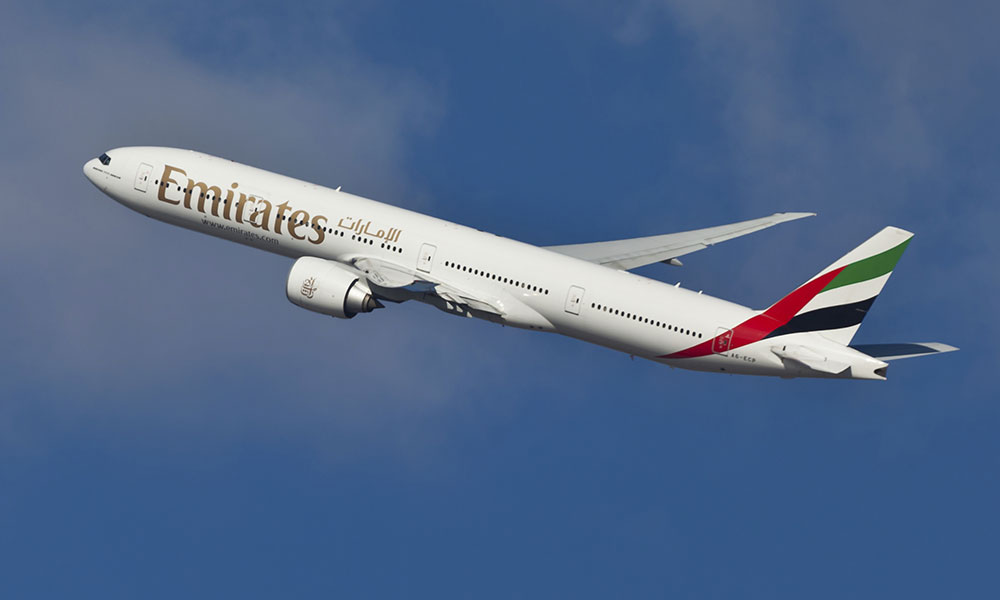
Turbulence in the Open Skies: Travel, Airline Groups at Odds Over Treaties
While agreements that allow international air carriers to serve U.S. airports have been successful in boosting travel, domestic carriers are starting to chafe in the face of increased competition. And that's causing some friction between traditional allies.
International “open skies” agreements, which set the rules for airlines to operate outside of their home countries, have opened up the United States to travelers from around the world. But airlines based here aren’t happy about the effects on their bottom line.
The result? Some cracks are showing in traditional travel industry alliances.
The three largest airlines in the U.S.—American, Delta, and United—have pushed the Obama administration to put new limits on carriers based in the Middle East, arguing that these airlines (one of which, Emirates, has become known for its business-friendly offerings) have an unfair advantage over American carriers. Some of those airlines are subsidized by their home countries. All three of the U.S.-based airlines say the open-skies agreements should be renegotiated.
“We welcome robust competition provided the playing field is level,” the airlines said, according to the New York Times. “A reopening of those open-skies agreements is the first step and the right step to ensure competition is preserved and enhanced.”
Meanwhile, the airlines are also fighting the efforts of a low-cost carrier, Norwegian Air, to get approval to fly into the U.S.
“It costs us a fortune for every day we don’t get the approval,” Norwegian Airlines CEO Bjorn Kjos told the International Aviation Club in November, according to The Hill. “We cannot start flying the aircraft that we buy into Asia. They have to stop in Stockholm or Copenhagen because that aircraft is not allowed to fly into the U.S.”
travel clash
The conflict, which has been brewing for months, has put travel groups, such as the U.S. Travel Association and the Business Travel Coalition, at odds with organizations that represent airlines, including Airlines for America (A4A).
In a statement, U.S. Travel President and CEO Roger Dow argued that the costs of a more protectionist approach to air travel could send negative ripples throughout the economy.
“Historically, shifts toward protectionism have ended up hurting markets and choking off growth and job creation,” Dow said. “Travel to and within the United States has lately been under assault from protectionist, anticompetitive forces, and the move against open skies is the latest example.”
A4A, however, contends that international airlines get the advantages of offering service in the United States without the costs that U.S. carriers incur.
“Unlike foreign carriers, U.S. airlines serve small, rural, and other nonhub communities throughout the country,” A4A said in a statement acquired by The Times. “More profitable international operations enable domestic carriers to provide service to less profitable small and rural markets.”
According to Skift, Airports Council International-North America, which represents the nation’s airports, finds itself in the middle of this debate: While ACI-NA has concerns about regional airports losing out to more profitable international hubs, it backs the continuing use of open-skies agreements.
“Over the last 22 years, the 114 open-skies agreements the U.S. has negotiated have generated millions of dollars of economic development for communities throughout the United States,” ACI-NA President and CEO Kevin Burke said in a statement. “We cannot let the parochial position of a few airlines or their labor unions jeopardize a system that greatly benefits U.S. airports and the communities they serve.”
The issue comes at a time when ACI-NA is pushing for an increase in the passenger facility charge that’s tacked onto airline tickets—a change that A4A opposes.
Emirates, one of the airlines whose access to the U.S. market has been questioned by American airlines. (iStock Editorial/Thinkstock)






Comments